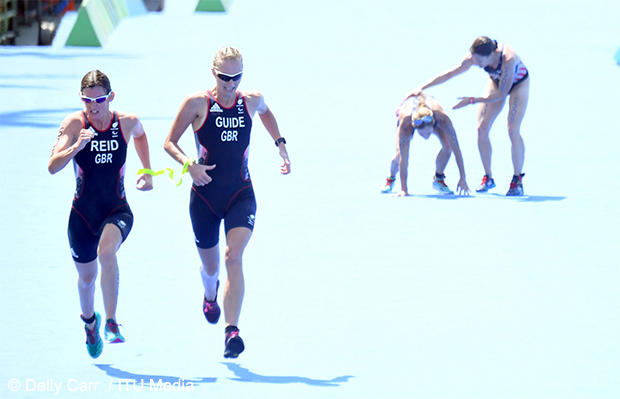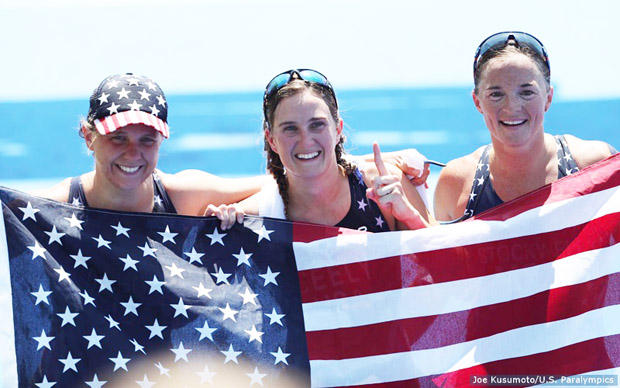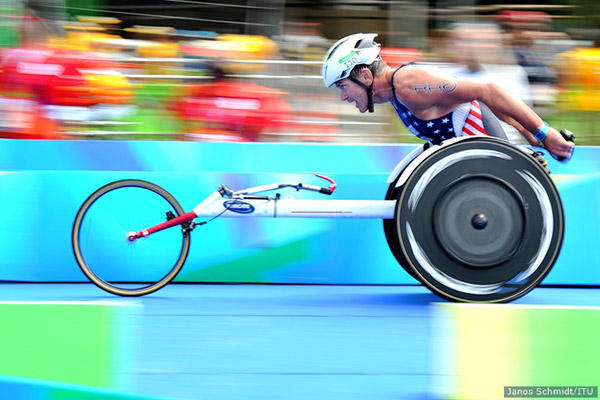Tokyo Paratriathlon – US tops with five medals

The PTS5 races closed out the eight paratriathlon events that were held over two days at the Paralympic Games Tokyo 2020.
The United States, entering athletes in seven of the races, led the paratriathlon medal count with five total medals; Spain followed with four, while Great Britain had three.
The U.S. team also earned the most gold medals with three; no other nation had more than one. The golds were won by Kendall Gretsch (Downers Grove, Ill.) in women’s PTWC, Allysa Seely (Glendale, Ariz.) in women’s PTS2 and Brad Snyder (Baltimore, Md.), with guide Greg Billington (San Francisco, Calif.), in men’s PTVI, while Hailey Danz (Colorado Springs, Colo.) in women’s PTS2 and Norman in women’s PTS5 secured silvers. Danz, Norman and Seely earned the second Paralympic triathlon medals of their career, while Gretsch (Nordic skiing) and Snyder’s (swimming) were their first in the sport after winning gold at previous Paralympic Games in other sports. Snyder’s was also the first Paralympic triathlon medal by an American man, and first individual U.S. men’s medal at an Olympic or Paralympic Games.
Course S 750m B 20km R 5km
Dates August 27-29
PTWC Men PTWC (WHEELCHAIR RACING PARA TRIATHLETES)
1 Jetze Plat NED H2 57:51 S 9:31 B 30:31 R 12:43
2 Florian Brungraber AUT H2 59:55 s 10:27 B 31:59 R 12:04
3 Giovanni Achenza ITA 1:02:05 11:44 B 33:32 R 14:48
The men’s PTWC was won by parasport legend Jetze Plat of the Netherlands, who also won PT1 gold in five years ago in Rio, in 57 minutes and 51 seconds. Austrian Florian Brungraber was 2 minutes 4 seconds back and Italy’s Giovanni Achenza took bronze in 1:02:05, repeating his PT1 medal in Rio. Plat is a two-sport Paralympic medalist. In addition to his two Paralympic triathlon gold medals and four paratriathlon world titles, the Dutchman earned bronze in the Paracycling road race H5 in Rio and has swept the time trial and road race gold medals at his last four world championships in that sport.
PTS4 Men (AMBULANT PARA TRIATHLETES)
1 Alexis Hanquinquant FRA 59:58 S 9:42 B 30:213 R 18:04
2 Hideki Uda JPN 1:03:45 S 12:52 B 30:30 R 18:20
3 Alejandro Sanchez-Palomero ESP 1:04:24 S 11:14 B 31:29 R 19:32
Triathlete Alexis Hanquinquant gave the French team its third gold medal at the Tokyo 2020 Paralympic Games by winning the PTS4 triathlon. A three-time world champion (2017, 2018 and 2019), the 35-year-old athlete from Normandy was the only competitor to record a time under one hour (59 minutes 58 seconds) and beat his Japanese rival UDA Hideki by almost four minutes. "It's been a very good day for me. I hoped to win today and I don't realize it quite yet. It really is a dream come true. I will never forget today," Hanquinquant said.
PTS5 Men Standing athletes with a limb impairment, for example an arm or leg amputation or functional impairment such as cerebral palsy. In this category the use of assistive devices such as prosthetic legs is permitted for cycling and running.
1 Martin Schulz GER 58:10 S 10:28 B 28L52 R 17:11
2 George Peasgood GBR 58:55 S 9:27 B 29:14 R 18:43
3 Stefan Daniel CAN 59:22 S 10:31 B 30:13 R 16:50
4 Chris Hammer USA 59:28 S 11:31 B 30:08 R 16:04
The men’s PTS5 race was won by German Martin Schulz, who captured the inaugural PT4 Paralympic gold and three world titles in that category, in 58 minutes, 10 seconds. Great Britain’s George Peasgood earned silver in 58:55 after taking PTS5 bronze at both the 2013 and 2018 World Championships. Three-time reigning PTS5 world champion Stefan Daniel of Canada settled for bronze in 59:22, five seconds ahead of Chris Hammer. Hammer, a 2012 Paralympian in track and field, was also fourth in the PT4 in Rio, missing that podium by 29 seconds.
Stefan Daniel of Canada was two minutes behind leader Martin Schulz of Germany when he got off his bike in 4th place. But Daniel refused to surrender and powered on the run along Copacabana Beach. Schulz won gold in 1:02:37 with Daniels 30 seconds behind, in third place.
Born with bilateral radial club hands, the 24-year-old’s right arm is shorter than his left arm, but that hasn’t stopped him from becoming one of the best triathletes in the world.
Daniel has four world championships to his name and is ranked at number one in the world.
George Peasgood, led out of the swim by over minute and still held a gap over Schulz heading into the final 5km, but it didn’t prove quite enough as the German ran a 17:11 split to clinch victory by 45 seconds.
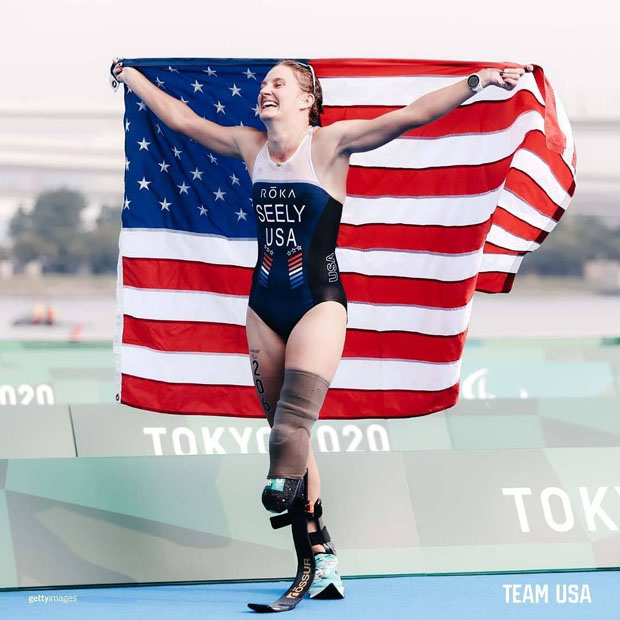
PTVI Men [Athletes with vision impairments – Class 1 for athletes with the most severe impairment. Athletes are assisted by a guide of the same sex; a tandem (two-person) bicycle is used for the cycling.
1 Brad Snyder B1 USA 1:01:16S 10:35 B 29:09 R 19:31
2 Hector Catalá Laparra B2 ESP 1:02:11 S 10:434 B 28:45 R 17:45
3 Satoru Yoneoka JPN 1:02:20 S 11:49 B 29:34 R 18:41
5. Kyle Coon USA 1:03:00 S 12:09 B 29:19 R 19:28
Competing at his third Paralympic Games, but first in paratriathlon, Brad Snyder of Baltimore, Maryland won the men’s PTVI race August 28 at the Paralympic Games Tokyo 2020 with guide Greg Billington San Francisco, California.
Snyder is the first U.S. man to win a Paralympic — or Olympic — medal in an individual event in triathlon. He is also the first male Paralympic gold medalist in the visually-impaired category, which made its Paralympic debut in Tokyo for the men after the category was contested only for women at the 2016 Paralympic Games in Rio.
Snyder and Billington won in a time of 1 hour, 1 minute and 16 seconds, followed by Spain’s silver medalist Héctor Catalá Laparra with guide Gustavo Rodriguez Iglesias in 1:02:11 and Japan’s Satoru Yoneoka with guide Kohei Tsubaki in 1:02:20 for bronze.
U.S. Navy veteran Snyder, one of the most preeminent Paralympians of the past decade, lost his eyesight in a 2011 IED explosion while serving in Afghanistan. He made his Paralympic debut in swimming at the London 2012 Games, where he won 100-meter freestyle S11 gold, 50-meter freestyle S11 silver and 400-meter freestyle S11 gold, the latter coming on the one-year anniversary of his fateful explosion. He was selected by teammates as the United States’ Closing Ceremony flag bearer in London.
Snyder and Billington, a 2016 Olympian who placed 37th in Rio, began racing together in early June. They led the Paralympic race from start to finish at Odaiba Marine Park on August 28 .
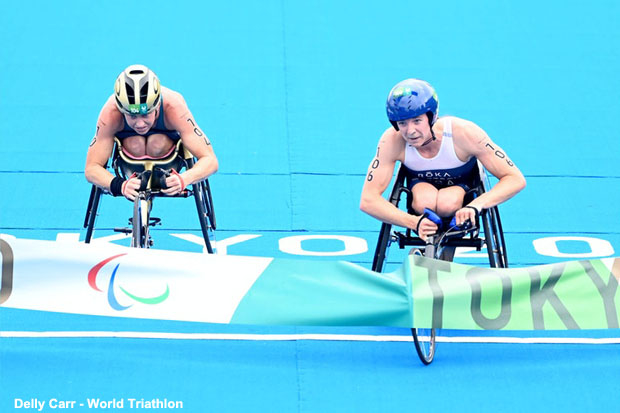
PTWC Women (seated) is for athletes with impairments of muscle power, range of movement, limb deficiency such as single or double leg amputation, and spinal cord injuries resulting in paraplegia or tetraplegia. Class 1 is for athletes with a more severe impairment based on hip and trunk function) In this category handcycles are used for the cycling leg and wheelchairs for the running leg.
1 Kendall Gretsch H2 USA 1:06:25 S 11:12 B 35:58 R 12:55
2 Lauren Parker H1 AUS 1:06:26 S 11:47 B 37:03 R 14:16
3 Eva Maria Moral Pedrero H1 ESP 1:14:59 S 13:51 B 41:27 R 16:33
Making her Paralympic triathlon debut, Kendall Gretsch of Downers Grove, Illinois won the women’s PTWC gold medal in thrilling fashion. After one hour and six minutes of racing, the difference between gold and silver came down to one second. American Kendall Gretsch chased down Australian Lauren Parker in the homestretch of the women’s triathlon PTWC to win gold.
Gretsch said she wasn’t able to see Parker in front of her until the final of four laps during the 5km run. “As soon as I saw her, I was like, ‘Hey, you just have to do it.’ You have to give everything you can,” the 29-year-old Gretsch said.
Gretsch was in second place for most of the race, but a furious finish in the final straightaway allowed her to reach 2019 world champion Lauren Parker of Australia in the final meters and secure the gold medal by one second.
Gretsch won in 1 hour, 6 minutes and 25 seconds, with Parker finishing in 1:06:26. Spain’s Eva Maria Moral Pedrero took the bronze in 1:14:59.
Gretsch made history not only by winning the first women’s triathlon wheelchair race contested in Paralympic history, but also in adding a summer-sport gold medal to the two she claimed at the Paralympic Winter Games PyeongChang 2018.
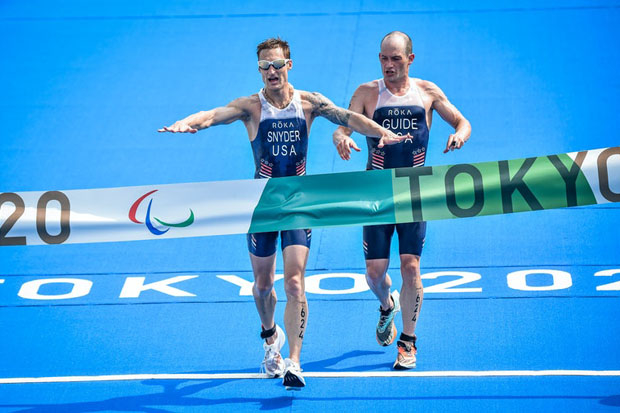
PTS2 Women [standing athletes with a limb impairment, for example an arm or leg amputation or functional impairment such as cerebral palsy. Athletes are divided into Classes 2-5 based on their impairment. In this category the use of assistive devices such as prosthetic legs is permitted for cycling and running.
1 Allysa Seely USA 1:14:03 S 12:47 B 36:29 R 21:52
2 Hailey Danz USA 1:14:58 S 12:32 B 35:06 R 24:13
3 Veronica Yoko Plebani ITA 1:15:55 S 12:29 B 36:37 R 23:56
5 Melissa Stockwell USA 1:21:25 S 12:07 B 38:44 R 26:36
Two-time Paralympians Allysa Seely (of Glendale, Arizona and Hailey Danz of Colorado Springs, Colorado earned gold and silver, respectively, to secure the first women’s paratriathlon medals awarded at the Tokyo 2020 Paralympic Games.
Seely and Danz were part of an historic U.S. sweep of their category five years earlier during the sport’s Paralympic debut at Rio 2016 and are now the first multi-medalist paratriathletes in Games history. Seely and Danz finished in the same order in Rio, where teammate Melissa Stockwell of Colorado Springs, Colorado took the bronze. With the same trio qualifying for the Tokyo Games, Stockwell finished fifth on August 28 in Tokyo.Seely won in a time of 1 hour, 14 minutes and 3 seconds, followed by Danz in 1:14:58 and Italy’s Veronica Yoko Plebani in 1:15:55 for her first medal at a major international competition.
Japan’s Yukako Hata was off to a strong start in her home country, finishing first out of the water in the 750-meter swim in 11 minutes, 55 seconds. Stockwell was next out of the water, 12 seconds back, with Plebani third at 12:29, followed closely by Danz. Seely was fifth in 12:47 but had a quick transition to enter the bike in third.
Tokyo was the third Paralympic Games for Stockwell, a 41-year-old mother of two and U.S. Army veteran who competed in swimming in 2008, just four years after becoming the first female American soldier to lose a limb in active combat while serving in Iraq.
The 30-year-old Danz took advantage of her best discipline and made her way to the front on the first of four laps on the 20-kilometer bike. She led Plebani by 11 seconds, with Seely 3 seconds back. Great Britain’s Fran Brown caught Danz on the third lap, but Danz ultimately finished the leg four seconds ahead of Brown.
Seely was in fourth after the second transition — 1 minute, 26 seconds behind from Danz — but made her move on the run, quickly decreasing her deficit to 1 minute, 4 seconds, then 37 seconds, then just 6 seconds with one lap left. She passed Danz in the final kilometer, winning by 55 seconds.
Her victory was made all the more impressive by the series of health challenges Seely faced in 2020, which included multiple infections in her leg starting in January and an eventual diagnosis of endocarditis, an inflammation of a clot in her heart.
“I really just want to dedicate this win to everybody who have ever been told they can’t, especially to the Afghani Paralympians whose dreams were not able to be fulfilled today,” Seely told USA Triathlon media.
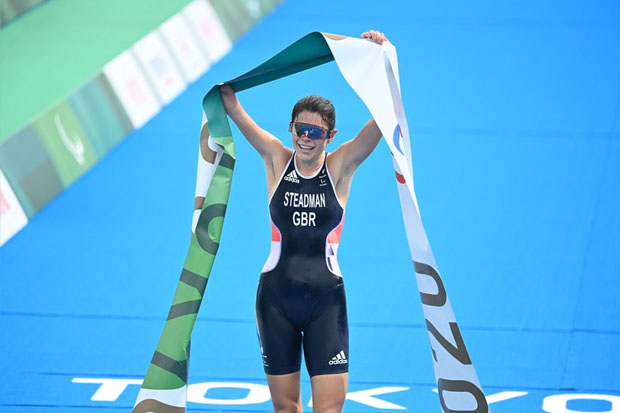
PTS5 Women PTS5 [standing athletes with a limb impairment, for example an arm or leg amputation or functional impairment such as cerebral palsy.]
1 Lauren Steadman GBR 1:04:46 S 11:55 B 31:45 R 19:05
2 Grace Norman USA 1:05:27 S 11:10 B 32:38 R 19:28
3 Claire Cashmore GBR 1:07:36 S 11:53 B 34:08 R 19:42
Two-time Paralympian Grace Norman of Jamestown, Ohio earned the second Paralympic medal of her career when she finished second in the women’s PTS5 on August 29 in Tokyo.
The top two spots of the women’s PTS5 podium saw a reversal of the women’s PT4 results from the Paralympic Games Rio 2016, where the sport made its Paralympic debut. Norman won gold in Rio, with Australia’s Lauren Steadman taking the silver.
This time, Steadman won the race in 1 hour, 4 minutes and 46 seconds, with Norman getting the silver in 1:05:27. Claire Cashmore of Great Britain was third in 1:07:36.
“I made a lot of sacrifices and a lot of changes in my life to get here, and I’m just so, so happy about it,” Norman said.
As Norman took to the water for the last race at the Odaiba Marine Park, she tore through the 750-kilometer swim to a 43-second lead over the trio of Cashmore, Canada’s Kamylle Frenette and Steadman.
The 23-year-old held on to her lead through the first half of the four-lap, 20-kilometer run but was then caught by Steadman, a four-time Paralympian who competed in swimming at the 2008 and 2012 Games. Cashmore was a minute back from Norman, who then knew she was guaranteed a medal.
With a strong running technique — she earned bronze in the 400-meter T44 at the 2016 Paralympic Games — Norman has been able to keep up with Steadman in the past, but it didn’t play out as she hoped in the four-lap, 5-kilometer run this time and the Australian’s lead continued to grow from there.
“The final lap, I knew where I was as far as I knew I wasn’t going to get past Steadman and I couldn’t make it to first, so I was just so, so happy, taking it in, holding back tears because this has been a journey to get here,” she said.


